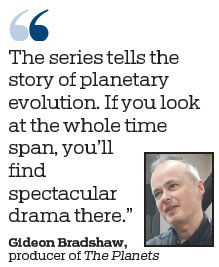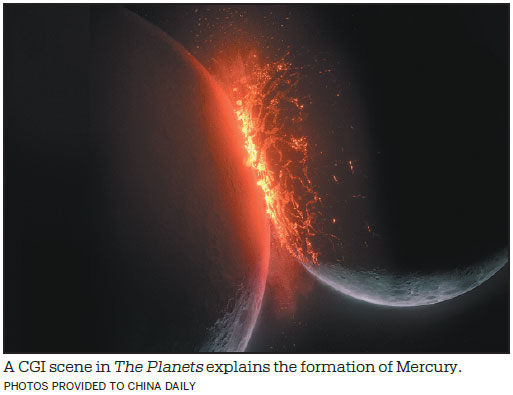The planets are the stars of online documentary
It is an old story, more than 4.5 billion years old.
Eight celestial bodies, each with their own distinct personality, born together and battling the violence of our early solar system, vying for their own survival and thriving to become stable planets.
Geological epochs come and go, entire atmospheres are formed and lost, and the planets themselves even begin to alter course. Thanks to a new documentary made by BBC Studios' Natural History Unit, it's all vividly portrayed with groundbreaking special effects and computer-generated imagery more akin to that of big-budget sci-fi movies.
The Planets, a five-part series that made its global debut on Wednesday, was coproduced by Tencent Video and released in China via the company's streaming video platform.
An online thematic broadcast plan called "Star Travel Season" was recently launched by Tencent Video to enhance the Chinese public's interest in astronomy. Other than The Planets, a series of space-themed documentaries, including Mars and Cosmos: A Spacetime Odyssey, both made by the National Geographic Channel, and the BBC's Wonders of the Universe, have been broadcast or are due to air.
"The series tells the story of planetary evolution," Gideon Bradshaw, producer of The Planets, says during an interview with China Daily following a prescreening in Beijing. "If you look at the whole time span, you'll find spectacular drama there. We give them (the planets) personalities."
For example, Earth and Mars are portrayed as sisters sharing a similar environment during childhood. However, when they reach adolescence, Earth escaped the overbearing clutches of their father, the Sun, to become a nurturing mother, while the less fortunate Mars did not, becoming barren and unwelcoming.
Jupiter, the oldest planet, is like "the Godfather", who demands respect and wields power and influence. It would have obliterated every rocky planet, including Earth, on its journey to the Sun, were it not for its tussle with Saturn.
Bradshaw explains that the team's approach to the production was similar to how Pixar makes its animated films.

"We put the turns, twists and dramas first, and we added the science afterward," he says. "When you watch, you probably don't know why you have feelings for these things, but you should feel sad when Mercury dies."
Mercury was born with the right ingredients for life, before it was dramatically flung into its current orbit with the Sun. Then, all hope for life was lost.
Bradshaw, an award-winning veteran of the British media industry, made a documentary along similar lines in 2010, titled Wonders of the Solar System, earning him a worldwide reputation. On popular Chinese review site Douban it gained a rating of 9.5 points out of 10.
The successful genes of that earlier show have been carried through to this new project.
As with Wonders of the Solar System, British physicist, Brian Cox, returns to host The Planets, but the use of special visual effects plays an even more important role than before. In each episode of Wonders of the Solar System, CGI accounted for only around 10 minutes of footage, but in The Planets, the scenes make up half the running time of each hourlong episode.
According to Bradshaw, some of the footage of the surface of various planets was shot in several locations around the world with similar terrains. For instance, a visualization of the greatest waterfall the solar system has ever known - Echus Chasma on Mars - used a waterfall in Iceland as the backdrop, before CGI transformed it into the violent torrent of water that appears on screen.
However, a bigger challenge was finding places which resembled the landscapes of gas giants like Jupiter and Saturn. The crew took gliders from the Alps to get a bird's-eye view of the clouds and crossed their fingers for helpful shooting conditions.
More importantly, new achievements in the exploration of the planets in the past decade have contributed fresh elements to the show, thanks to the abundance of data being transmitted back from Mercury and Saturn by spacecraft such as Messenger and Cassini-Huygens.
Despite this, compared with the other natural sciences, astronomy is exceptional in that much of it cannot be proved by lab experiments.
"It's changeable," the producer admits. "We suspect, and we have theories, but some things are contradictory to others."
Despite the boom in published academic papers on astronomy, the production team had to ensure that what is portrayed in the documentary does not stray "too far away from the consensus".
"Hopefully, what we have today is a good representation of the theories that will still stand tomorrow."
In The Planets, the theories are largely based on research led by NASA, but Bradshaw adds that even this situation is likely to change too.
"New series will continue to be released every decade, and there won't be just NASA in 10 years' time," he suggests. "Chinese missions are developing rapidly, and it is fascinating to think of the future."
Speaking of the future, Bradshaw considers the study of space, which can often seem to be irrelevant to people's daily lives, to have deeper meaning beyond pure science.
Venus, which is covered entirely by cloud, is an example of the overwhelming effect of greenhouse gases. Though the producer says he did not intentionally make environmental issues the focus of the show, he also hopes that it will inspire people to think more about the health of our own planet.
"When you look at today's Venus, you will gain a better understanding about Earth," he says.
wangkaihao@chinadaily.com.cn

(China Daily Global 05/30/2019 page16)


















